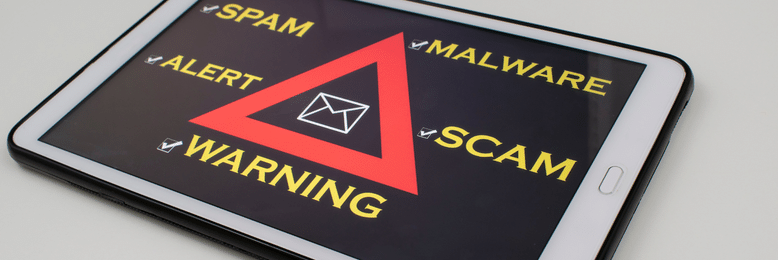Protect Your Business from Smishing Attacks
June 28th, 2022 | 3 min. read

Did you know that unsolicited text messages like smishing can be a gateway for malware attacks and other severe hacking incidents?
Smishing is a type of social engineering attack that can significantly affect your business. If successfully pulled, the perpetrator can steal valuable information, such as financial info and employee data, which they will use to do more harm to your company.
Here at Intelligent Technical Solutions (ITS), we help protect businesses from different forms of social engineering attacks using robust multi-layered cyber defense programs. Our mission is to help you create a safe and secure network by sharing our knowledge on both technology and cybersecurity.
In this article, we’ll lay out the things you need to know about smishing so you and your business can avoid becoming a victim of this type of digital threat. Here’s a glance of what we’ll tackle:
- What is smishing?
- How does smishing work?
- How to identify a smishing attack
- Protecting your business from smishing
What is smishing?

Smishing is a form of digital attack where perpetrators use compelling text messages to trick potential targets into giving up valuable information.
It’s another facet of a phishing attack, but the difference is that smishing is carried through SMS rather than email.
Since we are more reliant and connected to our mobile phones, we tend to trust text messages than emails. This vulnerability is what perpetrators exploit in this new scheme.
To add to that, a recent study by Finances Online revealed that 95% of text messages are read, and 45% are responded to while emails are 20% read, and 6% replied to. This means that cyberattacks have better chances of succeeding through smishing.
How does smishing work?
The sender may pose as someone you know, like the CEO of your company, a potential client or customer, or even a colleague. But no matter what mask they wear, their intent is all the same; steal valuable data and use it for their benefit.
Just like phishing, a smishing message carries a tone of urgency to trick their prey into sharing the information they want to acquire. What’s a better way to put your guard down than emergencies, right? The following are some of the common scenarios smishing attackers use to deceive their prey:
- A compromised account where you need to change your password
- Download a file to update your mobile or app
- An emergency involving a friend, family, or colleague
- You won a prize, but you need to put out money first
Smishing messages can also contain links to bogus websites where they can steal your credentials. It may also ask its target to download malicious software that can scan and farm your banking details and important information without your realization.
Here are some of the common info smishing attackers mine for:
- Credentials for online accounts
- Banking info
- Credit card details
- Social security details of employees
- Financial data that can be used for fraudulent transactions
It’s also important to take note that smishing perpetrators tend to target businesses more than regular people, as their gains are much higher if they succeed.
How to identify a smishing attack
Perpetrators will always employ their best tactic to hide their traces. As stated earlier, they will pose as someone your business deal with to gain your trust. But no matter how great their tricks are, there will always be ways to identify them. Here’s what to look out for when spotting a smishing text:
Suspicious mobile number
 Think twice if you receive a text message from someone claiming to be from a legitimate business while using a regular phone number. Businesses and known institutions often use a five to six-digit number called shortcode when sending texts to their clients and customers.
Think twice if you receive a text message from someone claiming to be from a legitimate business while using a regular phone number. Businesses and known institutions often use a five to six-digit number called shortcode when sending texts to their clients and customers.
If the sender claims to be someone from your company and their phone is unregistered in your business phonebook, then they are most probably cyber attackers trying to trick you.
Spelling and grammatical errors
 Most attackers don’t proofread their messages, as their main goal is to trick you into giving valuable information. So, if you receive a text from someone you don’t know and see errors with the spelling and sentence construction, be on alert.
Most attackers don’t proofread their messages, as their main goal is to trick you into giving valuable information. So, if you receive a text from someone you don’t know and see errors with the spelling and sentence construction, be on alert.
Suspicious links
 Most smishing texts include a link to a bogus website. Never click or visit that link, as it contains malware installed on your mobile, which will then steal essential data from your mobile device.
Most smishing texts include a link to a bogus website. Never click or visit that link, as it contains malware installed on your mobile, which will then steal essential data from your mobile device.
Asking for your credentials or any private information
 Suppose the sender is asking you to provide sensitive information such as your username and password, banking details, credit card info, and alike. In that case, you are most likely dealing with an attacker. Institutions wouldn’t ask their customers to provide such details through text or online.
Suppose the sender is asking you to provide sensitive information such as your username and password, banking details, credit card info, and alike. In that case, you are most likely dealing with an attacker. Institutions wouldn’t ask their customers to provide such details through text or online.
Protecting your business from smishing.
Though smishing is a severe cyber-attack, its ramifications depend on your response. You can easily avoid being a victim by not responding. Remember, damage can only occur if you take the bait.
Delete the message and block the sender to avoid receiving smishing messages in the future. You may also report it to 7726 so that your telecommunication provider can launch an investigation and cancel their service. This will also prevent perpetrators from reaching other potential targets.
Provide your number to business associates and employees only. Unless it’s a hotline or a contact point to your customer service, we suggest not sharing your digits. Do not use your business number in any personally used subscription service or when registering with a third-party service provider. Doing so reduces the risk of disclosing your number to strangers, thus resulting in lesser smishing and unsolicited SMS.
At ITS, we help businesses create and maintain a secure and safe network by deploying multi-layered cyber defense programs. Our mission is to help you make smart decisions on technology by sharing our knowledge of IT.
Get tips and learn lessons on how you can better defend your business from hacking by watching our video entitled Protecting Yourself from Cyber Attacks.
Topics:
